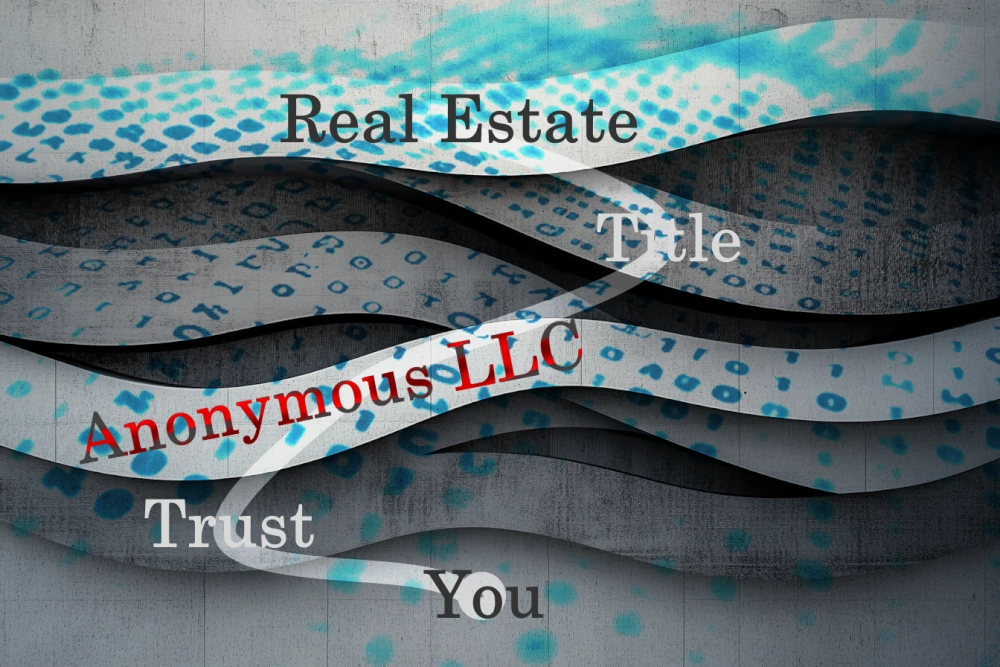By Greg Manwelyan, for readers who know that real privacy starts where the public record ends
Owning real estate is risky.
Not because the market will crash.
Not because of termites or tenants.
But because of the paper trail.
Every property deed is a breadcrumb. Every recorded name is a liability. And every signature you put on public title documents just made you easier to sue, stalk, or shake down.
If you’re still putting your own name on the deed—or even just stopping at a simple trust—you’re doing privacy wrong.
What you want is layering: a trust owning an LLC, and the LLC owning the property. That’s the play.
This is not offshore, illegal, or overly complicated. It’s lawful, tactical, and already used by the people who don’t show up in court databases or wealth tracking tools.
Let’s break it down.
Step 1: Trusts Alone Aren’t Enough
Yes, a revocable living trust is a good start. It:
- Keeps your estate out of probate.
- Lets you control who gets what when you die.
- Can keep your name off the top of the deed.
But it’s still weak when it comes to asset protection and anonymity.
Why?
Because in most states, if the trust is revocable (meaning you still control it), courts treat the assets inside it as yours. Litigators will too. If someone finds out you’re the grantor or trustee, they’ll pierce the veil before lunch.
Also, trusts often need to own property directly to have any effect. That means recording the trust’s name in public records—which, unless you’ve properly anonymized the trust, can just lead people right back to you.
Bottom line: trusts are helpful. But on their own, they’re not a fortress. You need armor over it.
Step 2: Enter the LLC—Your Legal Bodyguard
A Limited Liability Company (LLC) is a flexible legal entity that’s perfect for holding real estate. It:
- Offers liability protection (tenants slip and fall? They sue the LLC, not you).
- Can hide your name from the public, if structured right.
- Works well with tax planning and real estate investment strategies.
But there’s a problem: if you form the LLC, and you are the manager, and you are the member—then anyone pulling the company records or tax filings will still find you.
Especially in states like California, New York, or even Texas, where disclosure is baked into the corporate formation process.
So what’s the move?
Step 3: The Real Strategy — Trust Owns the LLC
This is where it gets powerful.
Instead of:
You → Own Real Estate
You do:
You → Set up Trust
Trust → Owns LLC
LLC → Holds Title to Real Estate
Now the trust is the member (owner) of the LLC, and the LLC is the public-facing owner of the property. When someone checks the deed, they see the LLC name. When they check who owns the LLC? They hit a wall: the trust.
And if you took our earlier advice and didn’t name your trust the “John Smith Revocable Living Trust”?
Even better. Try:
- “Acacia Grove Trust”
- “413B Holdings Trust”
- “Willet River 2023 Family Trust”
The goal is to create layers of plausible deniability and non-identifiability.
Step 4: Choose the Right States Like a Ghost Chooses Walls
LLC Location Matters.
Some states are privacy black holes. Others are privacy havens.
If you want true anonymity, form the LLC in:
- Wyoming – No publicly listed members or managers.
- New Mexico – No annual reporting of members at all.
- Delaware – Popular for corporate veil strength.
Don’t use California or Florida unless you like putting your name, address, and blood type in public databases.
And yes, your LLC can own property in a different state from where it’s formed. Just file as a foreign LLC in the property’s state, if required. You’re not dodging the law—you’re outsmarting the system.
Step 5: Use a Nominee Manager or Corporate Services Firm
If you list yourself as the manager of the LLC, congratulations—you just gave up the game.
Instead, use a nominee manager—a person or firm who legally acts as the manager in public filings but takes no actual control.
Or better yet, use a professional registered agent and let them form the LLC entirely. Your name never touches the paperwork. They file. They sign. They appear in records.
You control everything from the shadows.
Step 6: Don’t Use Your Home Address, Ever
Common mistake: filing a trust or LLC and putting your actual mailing address on the documents.
Now every real estate broker, lawsuit troll, or nosy coworker knows exactly where you sleep.
Use:
- A private mailbox (not a USPS PO box)
- A virtual office service
- A law firm address, if available
And don’t list your personal email or phone number anywhere near these entities.
Step 7: Get a Separate EIN and Bank Account
Do not use your Social Security number to open bank accounts for your LLC or trust. Get an EIN (Employer Identification Number) from the IRS—free and fast.
That EIN keeps your personal info out of IRS and banking records tied to the LLC. Same goes for property management, vendor contracts, and utilities. Keep everything separate.
Need to pay property taxes? Use the LLC bank account. Need to pay for landscaping? LLC account. This isn’t just bookkeeping—it’s identity armor.
Bonus Round: Title Insurance, Loans, and Real-Life Paperwork
Yes, you can still get title insurance with this structure.
Yes, you can get a mortgage—though most banks will make you sign personally.
Yes, you can sell the property without unwinding the whole structure.
This setup isn’t exotic. It’s just not widely advertised—because no one profits when you opt out of the exposure economy.
The Outcome: True Tactical Ownership
Let’s review:
You want a structure where:
- Your name isn’t on the deed.
- Your name isn’t in LLC filings.
- Your trust isn’t named after you.
- The trust owns the LLC.
- The LLC owns the property.
- And no one—not data brokers, not lawsuit diggers, not even nosy neighbors—can tie you to the property without serious effort.
This isn’t paranoia. It’s privacy by design.
Final Word: Own Nothing, Control Everything
If you still own property in your name, you’re exposed.
If you only use a trust, you’re halfway there.
But if you layer a trust over an LLC, and do it right?
You’re invisible.
Not in a tin-foil-hat, off-grid fantasy way. In a legal, tactically structured, digitally resistant way.
This is how real privacy is built. Not with wishful thinking—but with layers.




